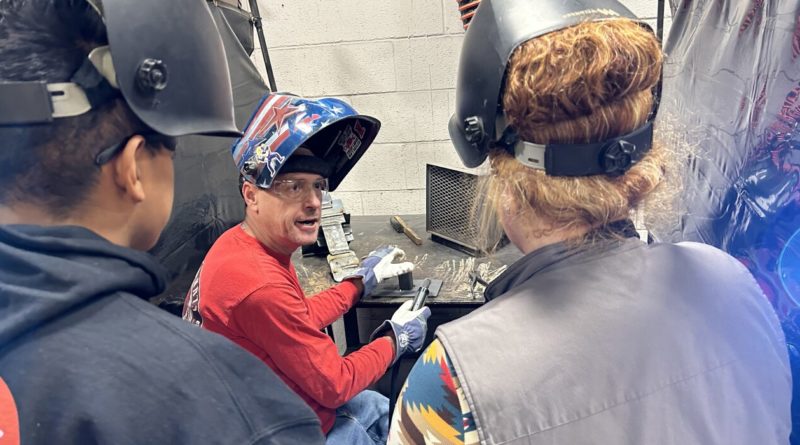Partners for Hands-On Learning
Teacher Takeover Day
When new agriculture instructor Cassidy Wiethoff attended a Train-the-Trainer small engine workshop last summer, she had no idea how meeting Hoemberg, the instructor, would so greatly benefit her and her Buffalo Lakes-Hector-Stewart High School (BLHS) students.
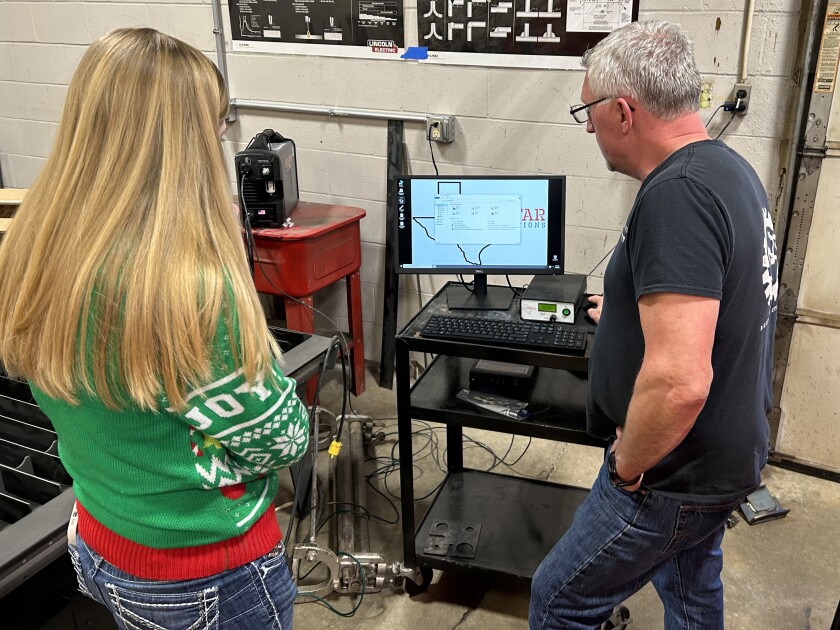
As a new teacher, Wiethoff expressed interest to Hoemberg about having technical experts visit her classroom. Soon, Hoemberg connected Wiethoff, Birkland and his colleague Judy Barka of the Minnesota State Agriculture Center of Excellence known as AgCentric. Together, they explored ways Ridgewater could support BLHS and advocate career and technical education (CTE) pathways.
The result?
About a dozen Ridgewater technical faculty members, support staff, student ag ambassadors, and Minnesota State outreach partners headed to BLHS for a first-time Teacher Takeover Day. In addition to assisting instructors, they connected with more than 100 high school students in grades nine through 12.
About Ridgewater:
Ridgewater College is a community and technical college with campuses in the central Minnesota communities of Willmar and Hutchinson. The college serves more than 5,000 students through its nearly 100 academic programs and more than 68,000 training hours for individuals and businesses through customized training and continuing education. The college is a member of Minnesota State and accredited by the Higher Learning Commission of the North Central Association of Colleges and Schools.
Minnesota State includes 30 community and technical colleges and seven state universities serving approximately 340,000 students. It is the third-largest system of two-year colleges and four-year universities in the United States.
The Goal
“The goal was to provide a service to Cassidy and Jill Grams, two local CTE instructors,” Birkland explained. “This is Cassidy’s first year as a teacher, so our goal was to make sure she felt supported in her new role by letting her know that Ridgewater has resources to support her classroom. Due to the difficulty high schools face with busing expenses and sub shortages, we asked Cassidy, ‘Can we come out to you!?’”
Wiethoff welcomed the invitation, so five Ridgewater programs took their shows on the road.
“It really was a great day,” Wiethoff said. “It was so cool to see these kids having so much fun learning.”
She had one student experience so much welding that he didn’t want to leave to go to his next class. Another student told Wiethoff that he improved so much that welding is all he wants to do now.
“As a technical trades college instructor, I’m always humbled to step into the environment of our secondary institutions to take in what they must teach with in terms of space, equipment, and resources,” said Greg Ryder, Ridgewater machine tool instructor. “The talented educators reminded me of the importance of working together, collaborating and just being human.”
The Basics
Ryder taught Wiethoff some basics to engage her students on the school’s computer numerical control (CNC) trainers to explore manufacturing career opportunities, and introduced her to a computer-controlled plasma water table for cutting steel plate into useable shapes and sign work.
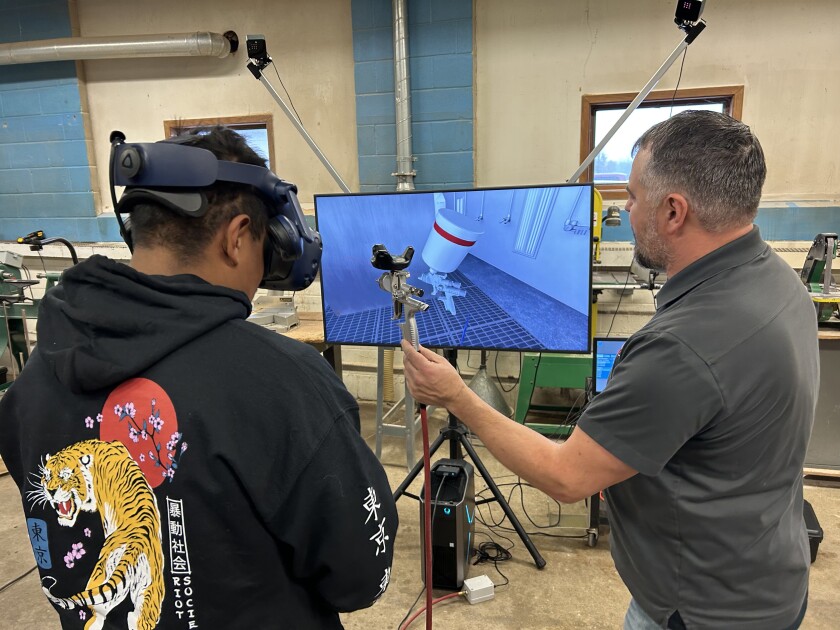
Automotive trades instructors Kevin Larison and Kelly Rue showed students how an ignition system works on a typical car, and related that to the small engines students were working on in class. They also introduced them to scan tools for diagnosing problems like misfires.
“The virtual reality paint booth was fantastic —my kids were still talking about it after lunch,” Wiethoff said.
Ridgewater’s meat-cutting instructor Sophia Thommes spoke with the food science students, sharing details about that new program and the career possibilities.
Other ag topics and activities during Teacher Takeover included college student stories of how internships connect learning to future careers, the importance of marketing ag commodities, alternator disassembly, and practices to help people be good stewards of land and soil.
“The great part of this day is that when students explore different activities, they can connect those experiences with careers to further explore,” said Tammy Howe, Ridgewater agriculture coordinator. “There are so many great jobs.”
“Having the ability to work with the students directly was important,” said Ridgewater welding instructor John Travis. The visit helped him realize the daily challenge some high school teachers have in trying to fit in so much content into 50-60-minute classes when that time also includes set up and take down. “We invited the teachers to come to Ridgewater so we can continue to build this relationship.”
A Marshall training connection
Marshall High School instructor Michael Braithwaite recently received a Launch Your Future Today (LYFT) grant to purchase two automotive trainers — one for steering and suspension activities and one for brakes. The problem was incorporating them into classes.
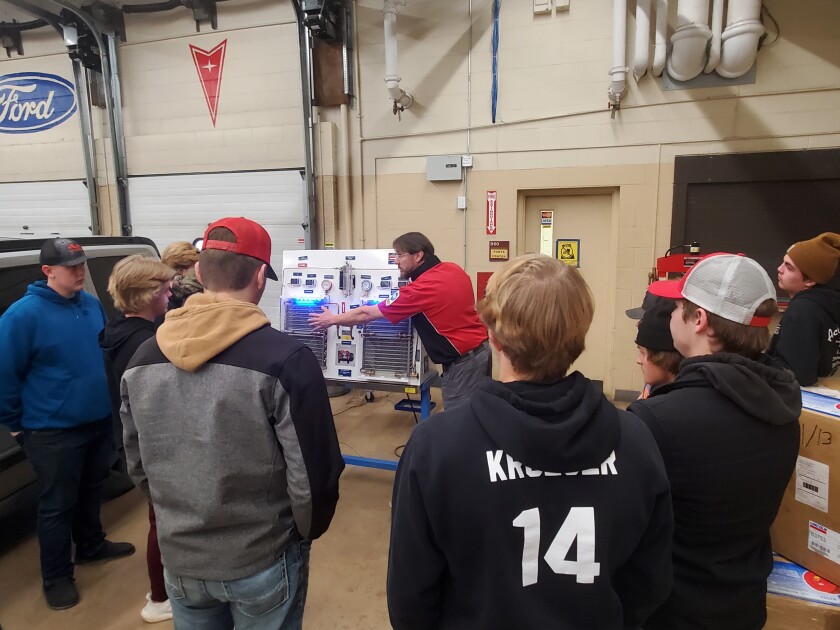
“Through our partnership with the Minnesota State Transportation Centers of Excellence, Steve Hoemberg made us aware of the trainers and that Michael could use some help learning how to run the trainers effectively with his students,” Birkland said.
A few discussions later, Braithwaite came to Ridgewater in December to learn from faculty member Jon Friton and brought close to 50 students to learn the basics with him.
“Our automotive service technology faculty quickly offered to help when approached with the idea of training both students and teachers,” Birkland said.
“I learned right with the students,” Braithwaite said, “but then over lunch, Ridgewater’s faculty showed me all the extra activities that I can do with the trainers and suggested some tools our school might consider purchasing to enhance the automotive learning experience even more.”
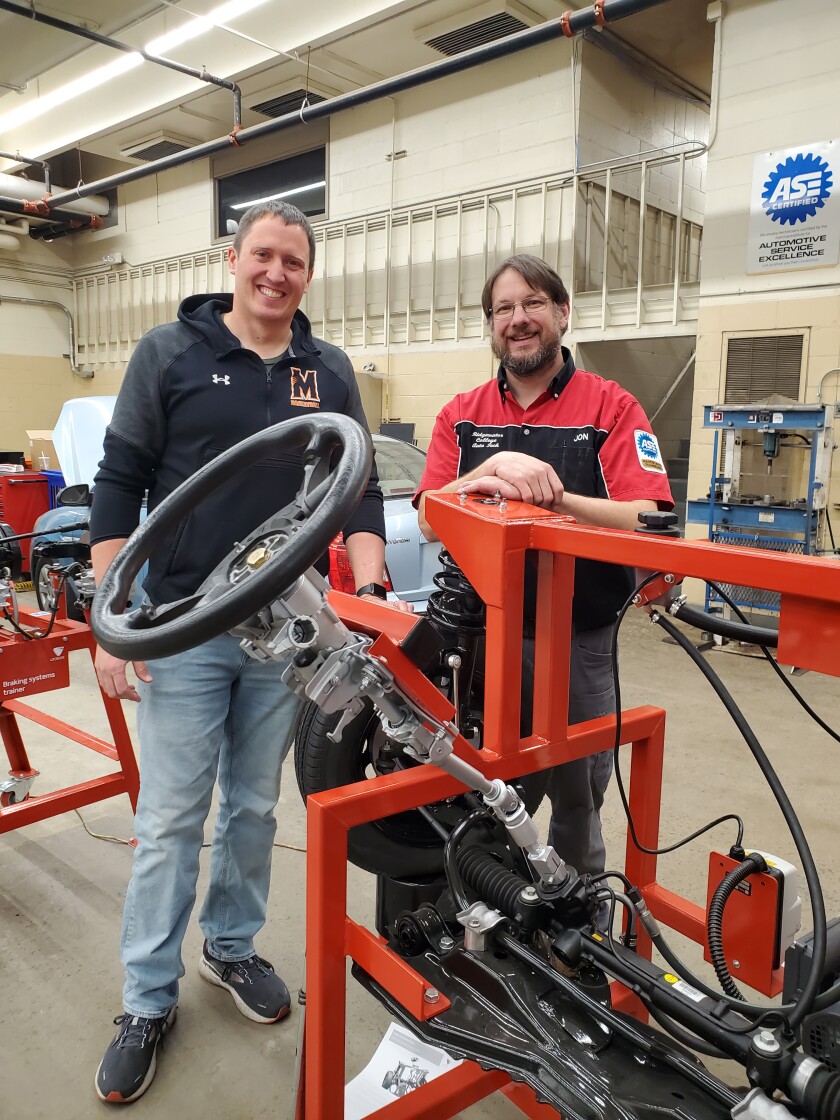
Expand the Impact
To expand the impact of the visit, Birkland arranged for students to also explore other areas they were interested in: auto body collision repair and welding.
Students tried a transmission dynamometer, engine scan tools and diagnostics equipment, a robotic welder, a welding simulator and a virtual reality paint system.
“It was really good for us all,” Braithwaite said.
As a current agriculture education teacher, he is excited to use the trainers and the new skills in his automotive classes now, but also when his high school opens a new career and technical education (CTE) center next year where he will teach the advanced automotives and advanced welding classes.

